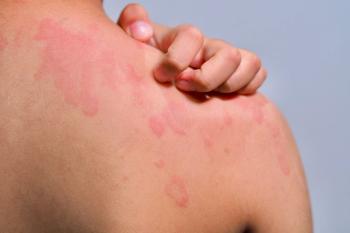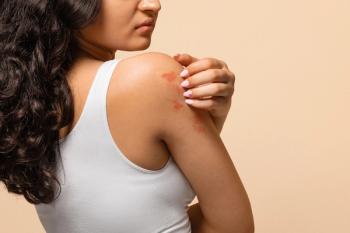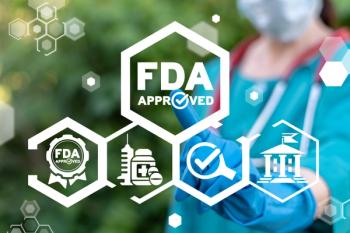
Repeat Dosing Study Demonstrates Positive Data for Neffy Epinephrine Nasal Spray
Manufacturer ARS Pharma will submit the data as part of a response to a CRL received in 2023.
Positive topline data has been reported for repeat doses of neffy (epinephrine nasal spray; ARS Pharmaceuticals), a potential needle-free option to treat type 1 allergic reactions, including anaphylaxis in adults and children weighing more than 66 lbs, ARS Pharmaceuticals stated in a press release.1
The study compared repeat doses of neffy to repeat doses of epinephrine intramuscular (IM) injections with and without nasal allergen challenge conditions in response to the FDA's request of a pharmacokinetic (PK) and pharmacodynamic (PD) study issued in a September 2023 Complete Response Letter (CRL).
The serious and potentially life-threatening events that could occur within minutes of
Though highly effective, it is known that users could delay or not administer treatment in an emergency situation for several reasons.
"The concept of using [neffy] is we know that a lot of patients are reluctant to either inject themselves or inject their children with epinephrine because of needle phobia," said Thomas Casale, MD, professor of medicine, chief of Clinical and Translational Research, Allergy and Immunology, University of South Florida, in an interview with Drug Topics sister site Contemporary Pediatrics.
"Having alternatives is very important," added Casale.
The randomized PK and PD study enrolled 43 patients with seasonal allergic rhinitis who tested positive with a Total Nasal Symptom Score (TNSS) of ≥5 out of 12 and a congestion score of ≥2 out of 3 during the screening NAC, according to ARS Pharma.
Read More:
Within 15 minutes of the nasal allergen challenge induction, all patients were dosed with epinephrine without allowing time for nasal symptoms to subside. Ten minutes after the first dose, a second dose was given, based on FDA labeling of epinephrine products.
Since IM is the reference-listed drug and historical basis for efficacy of "all other epinephrine products," the federal agency "explicitly requested that ARS Pharma include IM epinephrine... as the comparator in this study," the company said in the press release.
Primary analysis revealed that responses on the PD surrogate markers (systolic blood pressure and heart rate) for efficacy in anaphylaxis correlated well with PK exposures and were consistently higher for repeat doses of neffy compared to IM injection, irrespective of same or opposite nostril dosing (R/R or R/L).
Dosing in the same nostril (R/R) resulted in higher PH than injection at all time points measured. Dosing in the opposite nostrils demonstrated higher PD compared to injection until the 40 to 60 minute time points.
“When a severe, life-threatening allergic reaction occurs, it is necessary to administer epinephrine as soon as possible," said Casale, in the press release from ARS Pharma.
"[The] FDA asked what would happen if [nasal allergen challenge] conditions occurred during the 10% of anaphylaxis events that require a repeat dose of epinephrine. This study answers this question - exposures with repeat doses of neffy under NAC are at least as good as repeat doses of injection, and dosing in the same nostril is greater than injection," added Casale. "I believe the robust pharmacodynamic effect observed with repeat dosing in the same nostril or opposite nostrils compared to injection during [NAC] shows that neffy will be at least as effective as injection in reversing anaphylaxis symptoms, even during infrequently observed rhinitis of note."
ARS Pharma plans to submit data from the repeat dose study of neffy to the FDA early in the second quarter of 2024, as part of its response to the CRL issued by the federal agency for the previously submitted New Drug Application (NDA).
The company expects a Prescription Drug User Fee Act (PDUFA) date 6 months from filing, for potential approval and launch in the second half of 2024.
Read More:
Reference
1. ARS Pharma announces favorable topline results from repeat dosing study of neffy (epinephrine nasal spray) under nasal allergen challenge conditions, readies data for response to FDA’s Complete Response Letter. ARS Pharmaceuticals. Press release. February 20, 2024. Accessed February 21, 2024. https://www.globenewswire.com/news-release/2024/02/20/2831938/0/en/ARS-Pharma-Announces-Favorable-Topline-Results-from-Repeat-Dosing-Study-of-neffy-Epinephrine-Nasal-Spray-Under-Nasal-Allergen-Challenge-Conditions-Readies-Data-for-Response-to-FDA-.html
Newsletter
Pharmacy practice is always changing. Stay ahead of the curve with the Drug Topics newsletter and get the latest drug information, industry trends, and patient care tips.

























